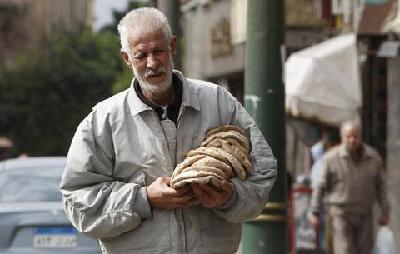
Many developing countries are closely watching the role escalating food prices is playing in the turmoil in North Africa.
Government repression, corruption, unemployment and poverty united protesters against President Hosni Mubarak. But experts say the rising price of food was one of the sparks that set off the historic protests.
The global price of wheat has risen 60 percent in the past year, and Egypt is the world's largest wheat importer. But that was not always the case, says policy analyst Marie Brill, with the advocacy group ActionAid.
"I find it actually ironic that bread lines are what provoked the latest political unrest, considering that in the 1960s, Egypt had been a breadbasket (major wheat producer) and able to meet its own wheat needs."
Focus on exports
So what happened? Brill says it goes back to the 1980s and 90s, when the United States, the World Bank and the International Monetary Fund encouraged developing countries to import grain produced cheaply in the US and elsewhere and to focus their farming on export crops.
"This has been a policy that has been pushed around the world, not just in Egypt or in the Middle East," Brill says. "But what we've found was that, as Egypt became more and more dependent on [imported] wheat, Egypt also became more and more vulnerable to price hikes and price volatility."
Others say the roots of Egypt's vulnerability go much deeper. Democracy activist Mohamed Eljahmi blames 1950s land reform laws and bad governance in Egypt, not economic policies emanating from Washington.
"That has been used as a crutch by Arab regimes to justify their failures," Eljahmi says. "The problem is, there is a legacy of corruption. There is a lack of accountability. So, the failure really rests with the nature of the military regime in Egypt. Not the IMF or anything."
Subsidized bread
Whatever the cause of the failure, Egypt's food production has not kept pace with its population growth.
As prices climbed in recent months, the Egyptian government had to pay dearly to import wheat for its subsidized bread program. The country was already deeply in debt, which limited how it could respond to the protests, according to senior fellow Mohsin Khan at the Peterson Institute of International Economics.
"So, they really didn't have any scope for doing what an oil-producing country like Algeria could, which is, you have unrest and you can throw money at it."
Algeria has made huge wheat purchases and set price controls following street protests. Not all citizens have been placated, and some protesters returned to the streets this weekend.
Other countries watching
Seventy-seven low-income countries rely heavily on food imports, according to the UN Food and Agriculture Organization.
Khan says these countries are watching closely what has happened in Egypt. "Policymakers in these countries are going to say: 'Look, we have large-scale unemployment. We have high food prices rising and therefore pushing up inflation. This is likely to trigger protests in our country. So, what do we need to do?'"
Targeted aid, not subsidies
Khan says poor countries need to target help to the poor, rather than blanketing the economy with price controls or food subsidies, which are expensive and bad for the economy in the long run.
But they are among the easiest options. And Khan adds that people in other repressed countries may be inspired by events in Egypt and Tunisia, where food prices also contributed to the ouster of President Zine el-Abidine Ben Ali last month. He says governments will likely be tempted to step in rather than risk protests.
"It's going to be very interesting to see how it plays out in terms of who's going to be doing first," he says. "Are the protests going to come first, or [are the governments going to] start subsidizing food?"
Many experts agree the likelihood of protests is rising along with the cost of food.
placat: to make somebody feel less angry about something 安撫;平息(怒氣)
What it was like in Tahrir Square when Mubarak resigned
Despite talks in Egypt, protests continue
Egypt not alone in its economic problems
Israel fears unrest in Egypt could jeopardize peace treaty
(來源:VOA 編輯:崔旭燕)
